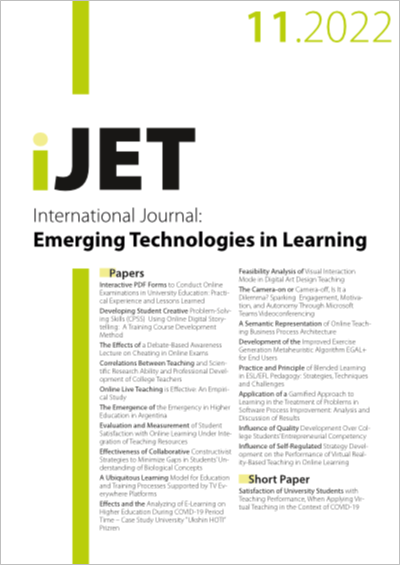The Effects of a Debate-Based Awareness Lecture on Cheating in Online Exams
DOI:
https://doi.org/10.3991/ijet.v17i11.30031Keywords:
Academic Integrity, Online Exams, Cheating Attempts, Rationalization, Debate LectureAbstract
Cheating in online exams has become an undeniable phenomenon throughout universities worldwide. This study examined the effect of a single factor on the scores and essay questions of online exams, helping the researcher identify cheating incidents. This factor was an awareness lecture, conducted in the form of a debate between the instructor and students, about the negative effects and ethics of cheating. The methodology of this study was based on the explanatory sequential approach, in which the researcher conducted the same online exam but with different treatments. Then, semi-structured interviews were conducted with certain students after the course had finished. The study consisted of two groups of students in the same course. Each group was given a different treatment: Group 1 consisted of 33 students who participated in an awareness debate lecture before the online exam, and Group 2 consisted of 31 students who did not participate in an awareness debate lecture. Then, 12 students were randomly recruited from Group 1 to participate in the interviews to explore more insights about the rationalization of cheating in online exams. The results showed that Group 1 had grades averaging (18.23 out of 30), and Group 2 had grades with a significantly higher average (22.1 out of 30). Conclusions and recommendations were presented to better shape the experience of online exams.
Downloads
Published
How to Cite
Issue
Section
License
Copyright (c) 2022 Adiy Tweissi

This work is licensed under a Creative Commons Attribution 4.0 International License.



